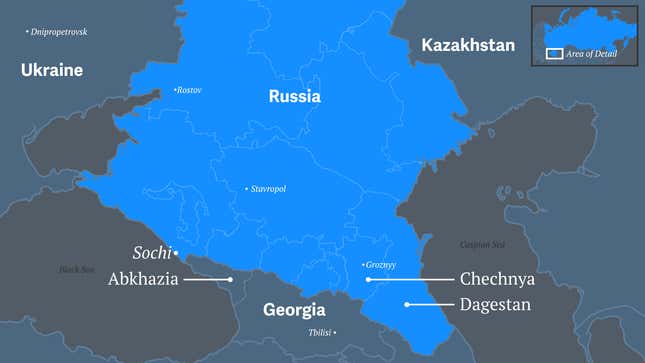With nine months to go before the 2014 Winter Olympics, the biennial sport of Olympics-bashing has begun in earnest. The International Olympic Committee (IOC) is being criticized for cost overruns and the other usual problems. And as always, the host country, this time Russia, is taking heat for cronyism, corruption, environmental concerns and construction delays.
But this time there is another, bigger set of worries. At several recent gatherings around the world, experts have wrung their hands publicly about how the XXII Winter Games pose the biggest security threat of any games in memory.
The Olympics, which will run from February 7th to the 23rd, are going to be held right in the middle of one of the world’s hottest conflict zones, the North Caucasus. Sochi, the host city, is a lovely resort town on Russia’s Black Sea coast. But the region around it is a cauldron of ethnic hatred and anti-Russian separatist movements. And then there is all of the organized crime, Islamist militancy and terrorism.

Some experts have been warning about security risks ever since the IOC picked Sochi in 2007 over bids from Austria and South Korea. But recent developments have alarmed Caucasus watchers. The two Boston Marathon bombers had ties to the region, and one of them spent six months last year in the Russian republic of Dagestan, where a virulent Islamist insurgency has been gaining strength. And a spat between Washington and Moscow, which this month accused a US diplomat of recruiting spies, has threatened to undermine what little counter-terrorism cooperation the two countries had.
“Unfortunately, security and the Caucasus do not go together. You might say the two words are a contradiction in terms,” Thomas De Waal of the Carnegie Endowment for International Peace told the Georgian Parliament in a speech last month. Last week, Paul Goble, a former CIA and State Department expert on the Caucasus who now runs the blog Window on Eurasia, spoke at the Central Asia-Caucasus Institute in Washington, warning that a confluence of events have made the Sochi Olympics a “disaster” in the making.
“In recent months it has become increasingly clear that Sochi is very much the wrong place for holding a winter Olympic games,” Goble told the crowd, which included officials from the State Department, FBI and the US military’s Central Command. He told Quartz: “The Sochi Olympics are being staged in the wrong place, at the wrong time, and by the wrong people. In terms of security, it is one of the least secure places on earth. It would be like holding the games in Beirut.’’
The potential for turmoil is virtually limitless. Southern Russia teems with ethnic groups that suffered massacres and exiles at Russia’s hands in the 19th century, and still chafe at the often repressive regime in Moscow. One of those groups, the Circassians, marks the games as the 150th anniversary of an alleged genocide. Chechnya, whose people were exiled en masse under Stalin, spent much of the last two decades as a battleground between separatist rebels and Russian forces. And neighboring Georgia is still smarting from Russia’s military invasion, which occurred during the 2008 Olympics.
There are fears that Islamist groups from nearby Chechnya and Dagestan could be plotting attacks already—on the Olympics, or elsewhere while Moscow’s security forces focus on the games. Such fears intensified last month when the Tsarnaev brothers—of ethnic Chechen origin—detonated home-made bombs at the Boston Marathon. Fighting between Russian forces and various militant groups has killed thousands in recent years, including a handful of guerillas in Dagestan in early May.
Perhaps Russian counter-terrorism official Oleg Nechiporenko summed it up best back in May 2010, in response to a car bombing in nearby Stavropol. The blast killed seven and wounded 40 others, and suspects included local mafia groups, separatists, Islamist militants, or even fighters from the breakaway Georgian region of Abkhazia. “The region is such a muddied and bloodied aquarium of conflict that to pick out any one fish is impossible,” Nechiporenko said.
